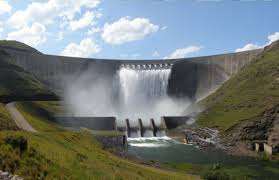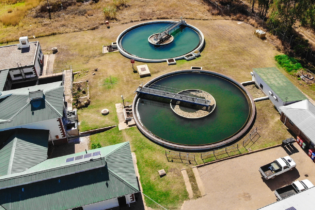
Katse Dam in The Kingdom of Lesotho
The department along with the Lesotho Highlands Development Authority (LHDA) hosted the second briefing session in South Africa on the second phase of the project.
Phase II primarily entails the delivery of water to South Africa, while delivering hydro-electric power generation for the Kingdom of Lesotho.
The department said the project was a critical source of water for the province of Gauteng, ensuring that the wheels of the South African economy continue turning.
The event saw a huge turnout of the prospective contractors interested in Phase II of the project.
Addressing the session on behalf of the department’s director-general Dan Mashitisho, was chief director responsible for integrated water resources planning, Livhuwani Mabuda.
“We want to see new players and experts evolve out of Phase II. Young people want to benefit from the roll out of this project,” Mabuda said. “We want new ventures, companies, collaborations to follow; new capacities and capabilities must evolve.”
“The turn out that we see today implies that people do want to contribute positively to the development of our two countries, looking at benefits that will be seen over a distant future,” he added.
Chief delegate of South Africa, Bheki Nkosi, said that in line with South Africa’s National Development Plan, the country was committed to ensuring that economic development and social upliftment remain critical for the people of Lesotho.
“It is important that women, the young and those with disabilities, participate in the process of ensuring sustainable development and continue to be empowered accordingly,” he said.
Infrastructure development
Part of the briefing raised awareness about the scope of Phase II, progress to date, and construction contracts.
The department said the main structures will include the building of the Polihali Dam and the tunnel that would join Polihali to the Katse Dam which is currently in operation.
It added that married to this process was the need to engage proactively with affected communities, being part of the lessons learnt from Phase I. “The extent of the impact on the communities needs to be clearly spelt out,” it said in a statement.
Results of the final analysis of how construction will affect their daily lives will impact the kind of resettlement that will be experienced, reinstating the kind of services expected, and thus creating the necessary harmony in execution, the department said.
Construction timelines were also shared, with a final water delivery date of 2025.
“The value of the contracts are envisaged to vary between R1 million and R1 billion, ensuring opportunities arise for all size contractors,” the department said.
All advertising for the tenders once available will be accessible via the media and will also be on the LHDA website.
Contractors were also assured that funding for work done on the project will not be compromised where the Lesotho government was responsible to raise funding for hydropower generation.
The responsibility for funding towards the actual delivery of water rests with the government of South Africa, as directed to the Trans-Caledon Tunnel Authority (TCTA).
Briefing pointers
The department said some of the ideals for briefing on the project included the need to maximize procurement opportunities, minimise the utilisation of imported skills, goods and labour.
“Part of the strategy is also to maximise the participation of Lesotho and South African contractors, especially black-owned entities,” the department said. “The LHDA Procurement Policy also limits the number and cumulative value of contracts that can be awarded to a single contractor.”
The department added that there will be a minimum threshold specified for participation of Lesotho Nationals and South African black-owned companies.






